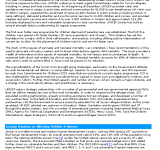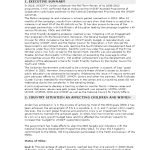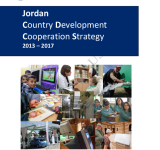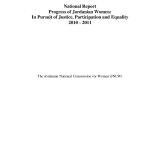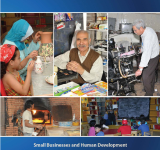والتمكين
The annual report provides an overview to the country situation in regards to children and women and summary of the humanitarian and developmental assistance of the UNICEF Jordan Country Office (JCO) in 2010. The report includes Jordan’s progress in achieving the Millennium Development Goals in addition to the analysis of the organization’s projects. The projects focus on assisting Iraqi children in education and strengthening young child survival and development and adolescents’ participation and empowerment. The analysis of the report is based on the progress and assessment of the JCO’s projects in partnership with other UN agencies;; local agencies and government ministries. Some highlights of the 2010 annual report include the Ma’An campaign to end violence in school;; the UNICEF’s partnership with the government in supporting Iraqi children in gaining access to public education and a joint programme to develop a tracking system to monitor family violence and abuse cases with other UN agencies and Jordan’s National Council for Family Affairs.
Defining the goal as improved prosperity;; accountability and equality for a stable;; democratic Jordan;; the strategy report highlights a long-standing partnership between Jordan and the United States. Amidst a number of challenges;; Jordan continues to play a strategic ally in the region and therefore;; the report stresses the importance of assisting Jordan in carrying out its stated commitment to broad-based political and economic reforms. The three development objectives are 1. Broad-based;; inclusive economic development accelerated;; 2. Democratic accountability strengthened;; and 3. Essential services to the public improved;; with a special development objective of gender equality and female empowerment enhanced. According to the report;; the key theme of the strategy is complementing support for Jordanian-led structural reform with grassroots activities of more visible and more directly “felt” people-level impact. The development objectives find specific areas of focus that need the USAID investments and support.
This national report is designed to trace the progress of women in various fields;; monitoring achievements;; and highlighting gaps and failures;; as well as analyzing indicators;; recommending measures;; and measuring levels of achievements in the implementation of plans and strategies. The main themes were selected according to national priorities dictated by each stage: Legal Protection for Women's Right to Access Justice;; Participation;; the Economic Empowerment of Jordanian Women;; Equality;; Citizenship and Decision-Making in Public Life. The conclusions of this report confirm that a much smaller effort was exerted at the level of providing information;; data and the provision of services in the area of providing justice and facilitating ways of achieving it. The lack of knowledge about available services among women;; whether provided by civil society organizations or government institutions;; affects women's ability to access justice negatively. Regarding the economic participation the Policies and plans that targeted empowering women economically show that the result of these policies was weak and limited. Difficulty of women’s access to job opportunities in the private sector and inequitable pay between the sexes;; lack of supporting services to working women;; including childcare Facilities;; poor matching between education outputs and skills required in the labor market and the traditional social standards that contribute to directing females towards certain professions. The report proposed general recommendations and directions that include quick solutions to deal with the main highlighted challenges.
This report explores the role of Small and Medium-Enterprises (SME);; as an agent for sustainable human development in Jordan. It analyzes SMEs and their contribution to human development using fours key central pillars of human development;; namely: economic growth that is equitable and pro-poor;; social progress;; participation and empowerment through micro finance;; and environmental sustainability. The report analyses the link between SMEs and empowerment or lack thereof;; with a specific focus on the two issues of employment;; as a tool for empowerment;; and the capacity of SMEs to enhance the position of women within the workforce and home. The report findings were based on extensive research;; a survey of 1;;500 firms and focus groups discussions conducted across the governorates of Jordan. The report proposed general recommendations in terms of institutional coordination;; exports;; cluster groups;; quality standard;; government monitoring;; tax law;; local development;; youth empowerment and the increase of minimum wage.
